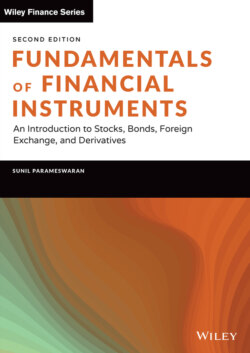Читать книгу Fundamentals of Financial Instruments - Sunil K. Parameswaran - Страница 17
На сайте Литреса книга снята с продажи.
A MARKET ECONOMY
ОглавлениеSuch economies work in principle as follows. Economic agents are expected to make the most profitable use of the resources at their disposal. What is profit? Profit is defined as the revenues from sales less the costs of production of the goods sold. Thus, profit is a function of the prices of the inputs or the factors of production, such as land, labor, and capital, and the prices of the output. An optimal economic decision is defined as the one that maximizes profit. Economic agents who generate surpluses of income over expenditure will obviously be able to attract more and better resources. Failure, as manifested by sustained losses, will result in those economic agents being denied access to the resources being sought by them.
In such systems the prices of both inputs and outputs are determined by factors of supply and demand. These economies, in contrast to command economies, are characterized by decentralized decision making. In principle, agents are expected to make a rational decision by evaluating competing resource needs based on their ability to generate surpluses. In practice, every decision maker will have a required rate of return on investment. The threshold return, or the return exceeding which the venture will be deemed to be profitable, is the cost of capital for the decision maker. A project is deemed to be worth the investment only if the expected rate of return from it is greater than the cost of the capital that is being invested.
As can be surmised, the key decision variables in these economies are the prices of inputs and outputs. Hence, for such economies to work in an optimal fashion, it is imperative that prices accurately convey the value of a good or a service, from the standpoints of producers who employ factors of production and consumers who consume the end products. The informational accuracy of prices results in the efficient allocation of resources for the following reasons. If the inputs for the production process, such as labor and capital, are accurately priced, then producers can take optimal production-related decisions. Similarly, if the consumers of goods and services perceive their prices to be accurate, they will make optimal consumption decisions. The accuracy of input-related costs and output prices will manifest itself in the form of profit maximization, which is the primary motivating factor for agents in such economies to engage in economic enterprise.
How do such systems ensure that prices of inputs and outputs are informationally accurate? In practice, this is ensured by allowing economic agents to trade in markets for goods and services. If an agent has the perception that the price of an asset is different from the value that he places on it, he will seek to trade. If the prevailing price is lower than the perceived value, buyers will seek to buy more of the good than the quantity on offer. If so, the market price will be bid up due to demand being greater than the amount on offer. This demand supply disequilibrium will persist till the price reaches the optimal level. Similarly, if the price of the good is perceived to be too high relative to the value placed on it by agents, sellers will seek to offload more than what is being demanded. Once again, the supply-demand imbalance will cause prices to decline till equilibrium is restored. Thus, differing perceptions of value will manifest themselves as supply-demand imbalances; resolving these will ultimately help ensure that the prices of assets accurately reflect their value.
Opinion: While free market economies have to a large extent been more successful than command economies, no one would advocate a total absence of the government's role in economic decision making. Unfettered capitalism is unlikely to find acceptance anywhere. There are disadvantaged sections of every society whose fate cannot be left to the market, and whose well-being must be ensured by policy makers to promote overall welfare. While societies characterized by command economies have historically not permitted free speech, in a country like the United States, even mild criticism of the market is considered to be heresy.
